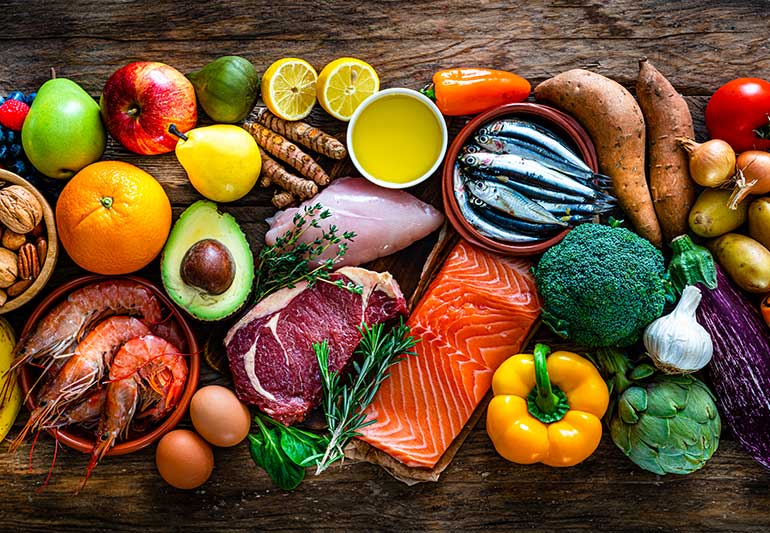In a world where fitness and wellness have become paramount, weight loss remains a prevalent goal for many individuals. While exercise plays a crucial role, a well-balanced and nutritious diet is key to shedding unwanted pounds and maintaining a healthy lifestyle.
In this article, we will explore some of the top weight loss diets that have gained popularity due to their effectiveness in promoting sustainable weight loss and overall well-being.
A. Top Weight Loss Diets
1. Mediterranean Diet:

The Mediterranean diet is not only renowned for its weight loss benefits but also its positive impact on heart health. It emphasizes whole foods such as fruits, vegetables, whole grains, lean proteins, and healthy fats like olive oil and nuts.
Remember, achieving and maintaining a healthy weight involves long-term commitment to sustainable dietary changes, regular physical activity, and overall lifestyle modifications
The diet is low in processed foods and added sugars, making it a highly nutritious and sustainable choice. Numerous studies have shown that the Mediterranean diet can lead to weight loss and reduce the risk of chronic diseases, including diabetes and cardiovascular issues.
2. Ketogenic Diet:
The ketogenic diet, or keto diet, has gained significant popularity in recent years. It involves consuming a high-fat, low-carbohydrate, and moderate-protein diet. By drastically reducing carbohydrate intake, the body enters a state of ketosis, where it starts burning fat for fuel instead of glucose.

The diet’s primary aim is to shift the body’s metabolism, leading to rapid weight loss. While the keto diet has shown positive results in short-term weight loss, it requires careful monitoring and may not be suitable for everyone. Consulting with a healthcare professional is crucial before embarking on this diet.
3. Paleo Diet:
The paleo diet is inspired by the eating habits of our ancestors during the Paleolithic era. It focuses on whole, unprocessed foods such as lean meats, fish, fruits, vegetables, nuts, and seeds. The diet excludes grains, legumes, dairy, and processed foods.

By eliminating processed and refined foods, the paleo diet encourages weight loss and reduces inflammation in the body. However, it’s important to ensure a balanced intake of nutrients while following this diet, especially regarding calcium and vitamin D, which can be limited due to the exclusion of dairy products.
4. Vegan Diet:

A vegan diet excludes all animal products and focuses on plant-based foods. It is often chosen for ethical, environmental, and health reasons. When followed correctly, a vegan diet can be an effective tool for weight loss.
Fruits, vegetables, whole grains, legumes, nuts, and seeds are the primary sources of nutrients in this diet. By eliminating high-calorie animal products, individuals can reduce their overall calorie intake and achieve weight loss.
However, it is essential to ensure sufficient intake of key nutrients such as vitamin B12, iron, and omega-3 fatty acids, which may be lacking in a vegan diet.
5. Intermittent Fasting:

Intermittent fasting has gained considerable attention in recent years for its weight loss benefits. It involves cycling between periods of fasting and eating. Common methods include the 16/8 method (fasting for 16 hours and eating within an 8-hour window) or alternate-day fasting.
Intermittent fasting helps to reduce calorie intake and promote fat burning. Additionally, it has shown potential for improving metabolic health and reducing the risk of chronic diseases.
However, it may not be suitable for everyone, particularly those with certain medical conditions. Consulting with a healthcare professional is advised before starting intermittent fasting.
B. Merits and Demerits of Each Diet
1. Mediterranean Diet:
Merits:
- Emphasizes whole, unprocessed foods, including fruits, vegetables, whole grains, lean proteins, and healthy fats.
- Provides a wide range of nutrients, including fiber, vitamins, and minerals.
- Promotes heart health and reduces the risk of chronic diseases.
- Sustainable and suitable for long-term adoption.
Demerits:
- May require time and effort for meal planning and preparation.
- Can be expensive, as it encourages the use of fresh and quality ingredients.
- Portion control is essential to ensure weight loss, as some Mediterranean foods can be high in calories.
2. Ketogenetic Diet:
Merits:
- Rapid initial weight loss due to the body entering a state of ketosis.
- Can help control blood sugar levels and improve insulin sensitivity.
- May lead to reduced hunger and increased satiety.
- May benefit individuals with certain medical conditions, such as epilepsy or type 2 diabetes.
Demerits:
- Requires strict adherence to a high-fat, low-carbohydrate diet, which can be challenging for some.
- Initial side effects, known as the “keto flu,” can include fatigue, headaches, and digestive issues.
- Limited food choices, as high-carb foods are restricted.
- Long-term effects and safety of the diet are still under investigation.
3. Paleo Diet:
Merits:
- Focuses on whole, unprocessed foods and eliminates processed and refined foods.
- Can lead to weight loss due to reduced calorie intake and increased consumption of nutrient-dense foods.
- May improve insulin sensitivity and reduce inflammation.
- Encourages the consumption of fruits, vegetables, and lean proteins.
Demerits:
- Eliminates entire food groups such as grains, legumes, and dairy, which may lead to nutrient deficiencies if not properly planned.
- Can be challenging to sustain in social settings or when dining out.
- May be higher in saturated fat due to increased consumption of meat and animal products.
4. Vegan Diet:
Merits:
- Emphasizes a wide variety of plant-based foods, including fruits, vegetables, whole grains, legumes, nuts, and seeds.
- Naturally low in saturated fat and cholesterol.
- Can lead to weight loss due to reduced calorie intake from eliminating high-calorie animal products.
- May reduce the risk of certain chronic diseases when well-balanced and properly planned.
Demerits:
- Requires careful planning to ensure sufficient intake of essential nutrients such as vitamin B12, iron, and omega-3 fatty acids.
- Protein sources may need to be combined to obtain all essential amino acids.
- Limited food choices when dining out or in certain social settings.
- Can be challenging for individuals accustomed to a meat-based diet.
5. Intermittent Fastingt:
Merits:
- Simplifies eating patterns and can be easier to follow for some individuals.
- Can lead to weight loss due to reduced calorie intake.
- May improve insulin sensitivity and metabolic health.
- Flexible approach, as different fasting methods can be adopted based on individual preferences.
Demerits:
- Not suitable for everyone, particularly individuals with certain medical conditions or a history of disordered eating.
- Initial adjustment period may cause hunger, fatigue, or irritability.
- Requires self-discipline and careful monitoring of food intake during eating periods.
- Long-term effects and safety of intermittent fasting are still being researched.
C. The Science Behind Weight loss
When it comes to closely adhering to the science behind weight loss, the Mediterranean diet stands out as a well-supported and evidence-based approach. Numerous studies have highlighted its effectiveness in promoting weight loss and improving overall health. Here’s why the Mediterranean diet aligns closely with scientific principles:
- Balanced Macronutrient Profile
The Mediterranean diet emphasizes a balanced macronutrient profile, consisting of a moderate intake of carbohydrates, healthy fats, and lean proteins. This balance ensures an adequate supply of essential nutrients while controlling overall calorie intake.
- Emphasis on Whole, Unprocessed Foods
The diet promotes the consumption of whole, unprocessed foods rich in vitamins, minerals, fiber, and phytochemicals. These nutrient-dense foods provide satiety, support metabolic health, and reduce the risk of chronic diseases associated with obesity.
- Healthy Fat Choices
The Mediterranean diet favors healthy fat sources, such as olive oil, nuts, and seeds, which provide monounsaturated and polyunsaturated fats. These fats have been linked to improved heart health, increased satiety, and better weight management.
- High Fiber Content
The diet encourages the consumption of fruits, vegetables, whole grains, and legumes, which are excellent sources of dietary fiber. High-fiber foods promote feelings of fullness, regulate blood sugar levels, and support healthy digestion.
- Reduced Intake of Processed Foods and Added Sugars
The Mediterranean diet minimizes the consumption of processed foods and added sugars, which are major contributors to excessive calorie intake and weight gain. By focusing on whole, unprocessed foods, individuals can reduce their overall calorie intake and make healthier food choices.
- Comprehensive Health Benefits
Beyond weight loss, the Mediterranean diet has been extensively studied for its positive effects on heart health, diabetes prevention, cognitive function, and longevity. These additional health benefits make it a holistic approach to overall well-being.
It’s important to note that while the Mediterranean diet aligns closely with scientific principles, individual responses to any diet can vary. Factors such as genetics, metabolism, and lifestyle should also be considered.
D. The Calorie Consumption Principle
The principle of calorie consumption plays a crucial role in weight loss. It revolves around the concept of creating a calorie deficit, where you consume fewer calories than your body needs to maintain its current weight.
This deficit forces your body to tap into its stored energy (fat) to make up for the shortfall, resulting in weight loss over time. Here’s how the calorie consumption principle factors into weight loss:
1. Calorie Intake: To lose weight, you need to consume fewer calories than your body burns. This can be achieved by reducing portion sizes, choosing lower-calorie options, and being mindful of your overall calorie intake.
Creating a moderate calorie deficit of around 500-1000 calories per day is generally considered a sustainable and effective approach for gradual weight loss.
2. Calorie Density: Calorie density refers to the number of calories in a given volume of food. Foods with high calorie density, such as sugary snacks and fried foods, pack a large number of calories into a small portion.
On the other hand, foods with low calorie density, such as fruits, vegetables, and lean proteins, provide more volume with fewer calories. By focusing on foods with low calorie density, you can consume larger portions while keeping your overall calorie intake in check.
3. Nutrient Density: While calorie consumption is important, it’s equally essential to consider the nutrient content of the foods you consume.
Opting for nutrient-dense foods, such as whole grains, lean proteins, fruits, vegetables, and healthy fats, ensures that your body receives the essential vitamins, minerals, and macronutrients it needs for optimal functioning. This supports overall health and helps to maintain satiety while managing calorie intake.
4. Energy Balance: Weight loss is ultimately a result of the energy balance equation: calories consumed versus calories burned.
While reducing calorie intake is a primary focus, increasing energy expenditure through physical activity is also vital. Incorporating regular exercise and physical activity into your routine can help burn additional calories, support muscle maintenance, and improve overall fitness levels.
When considering the principle of calories consumed versus calories burned, the diets that closely conform to this theory are the Mediterranean diet and the vegan diet. Here’s why:
5. Mediterranean Diet: The Mediterranean diet focuses on whole, unprocessed foods, including fruits, vegetables, whole grains, lean proteins, and healthy fats. While it doesn’t explicitly emphasize calorie counting, the diet naturally tends to be moderate in calories due to its emphasis on nutrient-dense foods.
By following portion control and making mindful choices within the framework of the Mediterranean diet, individuals can easily manage their calorie intake. Additionally, the diet encourages an active lifestyle, which contributes to the calories burned component of the equation.
6. Vegan Diet: A well-planned vegan diet, which excludes all animal products, is typically high in plant-based foods such as fruits, vegetables, whole grains, legumes, nuts, and seeds. These foods are generally lower in calories and higher in fiber, which promotes satiety and helps manage calorie intake.
By focusing on whole, unprocessed plant foods, individuals on a vegan diet can naturally control their calorie consumption. As with the Mediterranean diet, incorporating regular exercise and physical activity further contributes to the calories burned aspect of the equation.
It’s worth noting that while both the Mediterranean and vegan diets align with the concept of calories consumed versus calories burned, individual variations in portion sizes, food choices, and cooking methods can influence the overall calorie balance.
E. Conclusion:
When considering weight loss diets, it’s important to understand that what works for one person may not work for another. Each of the diets mentioned above has its merits and demerits. The Mediterranean diet offers a balanced and sustainable approach, while the ketogenic diet can lead to rapid weight loss but requires strict adherence.
The paleo diet focuses on whole foods but may require careful nutrient planning. The vegan diet is plant-based but necessitates attention to key nutrient deficiencies. Intermittent fasting provides flexibility but may not be suitable for everyone.
Ultimately, the best weight loss diet is one that suits an individual’s preferences, lifestyle, and health requirements.
It’s advisable to consult with a healthcare professional or a registered dietitian to determine the most suitable approach, considering personal goals, medical history, and nutritional needs.



0 Comments